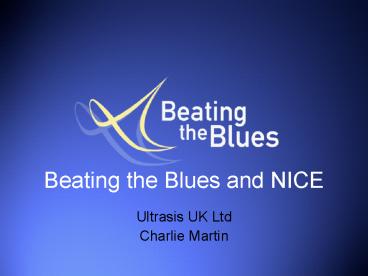Beating the Blues and NICE - PowerPoint PPT Presentation
1 / 23
Title:
Beating the Blues and NICE
Description:
Additive effects of antidepressant medication and Beating the Blues ... Demonstrated that Beating the Blues can be effectively used in different types of service ... – PowerPoint PPT presentation
Number of Views:157
Avg rating:3.0/5.0
Title: Beating the Blues and NICE
1
Beating the Blues and NICE
- Ultrasis UK Ltd
- Charlie Martin
2
Beating the Blues
- A Computerised cognitive behavioural therapy
(CBT) for anxiety and depression - Developed by Dr Judy Proudfoot and colleagues at
the Institute of Psychiatry, Kings College,
London in conjunction with Ultrasis UK Ltd - Makes effective psychological therapies more
available and accessible
3
CBT - Breaking the Cycle
- Identifies and challenges unhelpful thinking
patterns and beliefs - Changes behaviours
- Problem solving
- Task breakdown
- Activity scheduling
- Graded exposure
- Sleep management
4
Why computerised CBT (cCBT)
- Psychological therapies can be as effective as
drugs - CBT teaches life skills less chance of relapse
- Computerised CBT overcomes difficulties of
provision in some areas waiting times for face
to face can be 18months - Cost compares favourably to drugs and face to face
5
Screen Shot
6
National Institute of Health and Clinical
Excellence (NICE)
- Issues evidence based Clinical Guidelines for
diagnosis and treatment of medical conditions
for example, depression - Issues evidence-based Guidance regarding the
effectiveness of specific treatments for
example, computerised cognitive behaviour therapy
7
Developing NICE technology appraisals
- Assessment Report prepared by independent
academic centre consultants provide information - Independent panel considers this report and
evidence from experts and carers - Appraisal Consultation Document (ACD) prepared
- Consultees and commentators comment on the ACD.
- Final appraisal determination produced (FAD)
- Consultees can appeal against the FAD
- Guidance issued
8
CCBT Appraisal - History
- 2001 NICE begins an assessment of CCBT
- Oct 2002 guidance states that . the delivery
of CCBT may be of value The evidence is,
however, an insufficient basis on which to
recommend general introduction.. - NICE bring forward the review of the guidance
- June 2004 Ultrasis submits evidence for review
by the School of Health and Related Research
Sheffield
9
Evidence Submitted- Summary Content
- Product Description including training, support
services, manuals. - User hardware requirements
- Software licensing costs
- Clinical and cost effectiveness
- Acceptability and Satisfaction patients and
practitioners - Executive Summary and Declaration
- Total of 280 pages
10
Clinical effectiveness- published randomised
controlled trials
- Trials in 11 GP surgeries
- 274 patients randomly allocated to receive, with
or without medication, Beating The Blues or
treatment as usual with follow-up assessment at
6months - Outcome Measures
- Beck Depression
- Beck Anxiety
- Work and Social Adjustment Scale
11
RCT Summary
- Significant improvement over treatment as usual
- Effects maintained at 6 month-follow up
- Additive effects of antidepressant medication and
Beating the Blues - Gives people more symptom free days than
treatment as usual - Suitable for a wide range of people
12
RCT Results
13
Depression Free Days in 6 Months Post-Treatment
14
Cost- effectiveness published paper
- Service use analysis cost of all NHS services
for all patients in the trial - Analysis includes GP visits, in-patient care,
out-patient, counsellors, medication,
psychologists etc - Lost employment costs
- Cost-utility analysis
15
NICE analysis of Cost effectiveness
- NICE Cost model to assess the likely impact of
CCBT on the costs and effectiveness of treating
patients in primary care compared with treatment
as usual - Model based on data provided by Ultrasis
16
Cost Effectiveness - Summary
- Overall healthcare costs not impacted by Beating
the Blues - Significant lowering of lost employment costs
- Cost Utility Analysis shows that the incremental
cost of using Beating the Blues is low and well
within the acceptable range for new treatments
17
Cost Utility Analysis
- Incremental cost per QALY of using Beating the
Blues is estimated as being between 415 and
1801 (NICE analysis) - Upper limit is usually 30000
- A QALY is a quality adjusted life year life
expectancy times quality of remaining life years - A year of perfect health is worth one QALY, death
is equivalent to zero
18
Open Trial
- NICE requested further evidence that Beating the
Blues worked in routine care- outside the special
circumstances of a randomised controlled trial - Outcomes in eleven primary and secondary care
settings confirm clinical effectiveness
19
Patient Satisfaction
- Feedback data from 200 patients
- Features of the programme, satisfaction with the
treatment and overall helpfulness of the
treatment all rated very positively
20
Practitioner satisfaction
- Seven other papers from practitioners were
provided - A Brief Service evaluation of Beating the Blues
in 37 other locations was provided - Demonstrated that Beating the Blues can be
effectively used in different types of service
21
The appraisal what happened
- Original target June 2005
- NICE issued two consultation documents (ACDs) -
significant change after the first consultation - Appeal against the Final Appraisal Document (FAD)
in Nov 2005 - Final Guidance published Feb 2006
22
National Institute for Health and Clinical
Excellence. Computerised cognitive behaviour
therapy for depression and anxiety. Guidance (Feb
2006)
- 1 Guidance
- This review concerns five specific packages for
the delivery of computerised cognitive behaviour
therapy (CCBT) accessed via a referral from a
general practitioner (GP) three for depression
(Beating the Blues, COPE and Overcoming
Depression), one for panic/phobia (FearFighter)
and one for obsessive compulsive disorder (OCD)
(OCFighter, previously known as BTSteps). - 1.1 Beating the Blues is recommended as an option
for delivering cognitive behaviour therapy (CBT)
in the management of mild and moderate
depression.
23
Thank You
- cmartin_at_ultrasis.com
- 0207 566 3900































